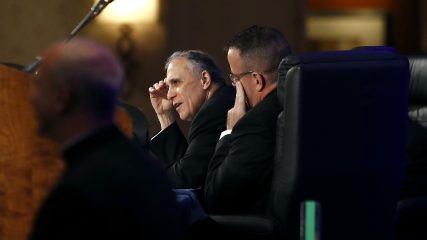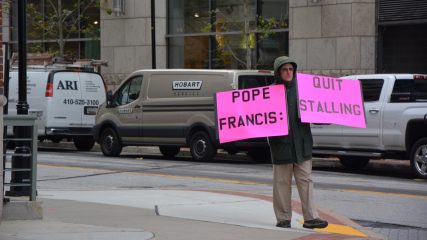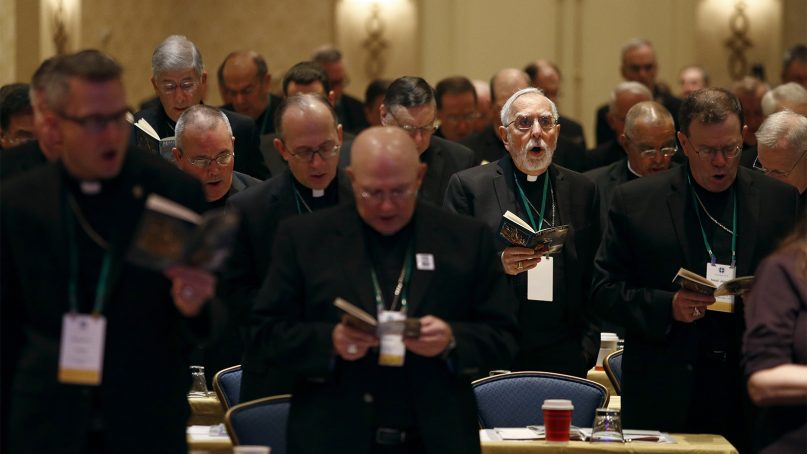(RNS) — When the American Catholic bishops met as a body last fall, they were on the verge of voting on a series of resolutions to show they were at last taking the sexual abuse crisis seriously — particularly their role disciplining and removing errant priests and fellow bishops.
Those votes were dramatically halted at the request of the Vatican, which was planning its own summit on sex abuse.
Now, three months after that conference in Rome, the bishops are heading to a summit in Baltimore this week, where they are facing pressure to pass those stalled resolutions — and then some.
The sex abuse scandal, which continues to roil the church from the parishes to the pope, will likely be the foremost topic of discussion at the three-day U.S. Conference of Catholic Bishops meeting (June 11-13). Originally scheduled as a retreat in California, the bishops changed it to a business meeting after they were unable to pass resolutions on the topic at their last meeting in November.
The pressure is all the higher because the Vatican’s four-day sex abuse summit in February fell short of instituting concrete reforms in the eyes of victims groups and other advocates for more transparency on the part of the church.
The onus is now on bishops to take action at their meeting, especially in the wake of new reports that Cardinal Daniel DiNardo, head of the Archdiocese of Galveston-Houston, did not do enough to stop a priest in his diocese accused of abuse, as well as allegations that he was slow to respond to a report of a sexual relationship between a priest and a female parishioner.

Cardinal Daniel DiNardo, of the Archdiocese of Galveston-Houston, president of the U.S. Conference of Catholic Bishops, left, leads the USCCB’s annual fall meeting on Nov. 13, 2018, in Baltimore. (AP Photo/Patrick Semansky)
DiNardo, the current president of the USCCB, is expected to chair the meeting in Baltimore.
The conference’s troubles were compounded when The Washington Post reported last week that a West Virginia bishop sent money to those who accused him of harassment. The previous week, the Vatican handled abuse allegations of a former archbishop of Washington, Theodore McCarrick, stripping him of his cardinal title after the allegations came to light.
Last month, Pope Francis issued a new church law requiring all Catholic priests and nuns across the globe to report to church authorities any sexual abuse by their fellow clerics or cover-up by their superiors.
But in a press release, the Survivors Network of those Abused by Priests published a list of four recommendations for the bishops, including a requirement for clerics to report suspected abuse to both church officials and police simultaneously. The group also wanted to see the immediate release of the names of all church workers accused of committing sexual crimes, a halt to church-led efforts to fight reform of statute of limitations laws, and to push leaders to turn over their records to law enforcement.
SNAP described Francis’ edict requiring clergy to report abuse internally as “a step in the right direction,” but incomplete, insisting law enforcement should be involved.
“Now, with this gathering in Baltimore, Cardinal Daniel DiNardo and the rest of America’s bishops have a chance to strengthen these requirements and push forward real changes that will help prevent future abuse,” the group said.
The Leadership Roundtable, a group made up largely of influential Catholic laity devoted to promoting better management in the church, also sent a letter urging the bishops to pass the proposals initially considered in November, as well as a slate of other initiatives.
“At the assembly we believe that the bishops need to commit to create a new culture of leadership that values accountability, transparency, and co-responsibility with clergy and laity,” Leadership Roundtable CEO Kimberley Smolik told Religion News Service. “This is a time for courageous, bold leadership.”

A lone protester stands outside the U.S. Conference of Catholic Bishops meeting in Baltimore on Nov. 13, 2018. RNS photo by Jack Jenkins
Smolik also called on leaders to address what she called the “twin crises” facing the church: abuse and leadership.
“There is a leadership crisis and there is a culture in our church that has created and allowed for an abuse of power,” she said, adding that the bishops’ reaction to the letter has been positive.
According to Catholic news website Crux, the bishops are hoping to vote on a trio of resolutions designed to address the abuse crisis. The first would implement Francis’ abuse reporting directive by establishing a national third-party reporting system to receive complaints of abuse or cover-up. Metropolitan archbishops would also be empowered to investigate a bishop in their see.
But the proposal sidesteps a separate suggestion raised at the November meeting that would have created a nonprofit to oversee such cases. That idea was reportedly dismissed by Vatican officials, who argued it superseded the authority of the pope.
Officials will also likely vote on a proposal explicitly stating that bishops are bound by the rules of the 2002 Dallas Charter — a series of reforms enacted by bishops in the wake of the Boston Globe “Spotlight” report that drew international attention to the abuse crisis. A separate proposal would also strengthen measures to hold accountable emeriti bishops who have resigned or been removed from office because of “grave acts of commission or omission.”
Bishops are also slated to discuss other issues at the gathering, such as immigration and updates regarding a document on religion and politics titled “Forming Consciences for Faithful Citizenship.”





